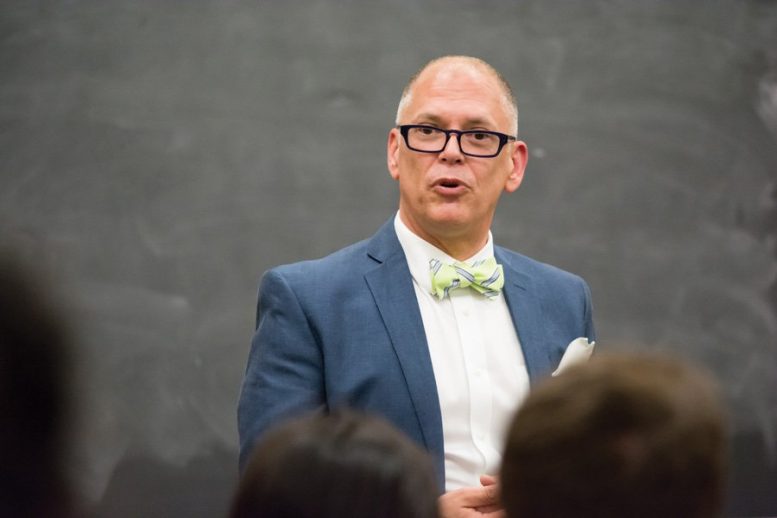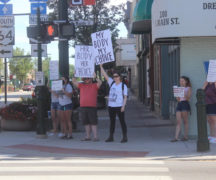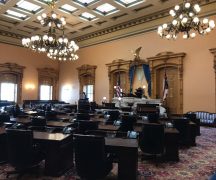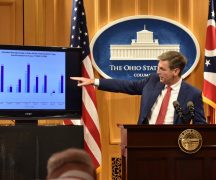The namesakes from the 2015 landmark case Obergefell v. Hodges warn that confirming Amy Coney Barrett to fill an open Supreme Court justice seat could have “drastic” implications for the LGBTQ+ community.
Five years after their case led to same-sex marriages becoming legal across the country, Jim Obergefell and Rick Hodges are speaking against President Donald Trump’s nominee. The two Ohioans are now friends and appeared together at a Tuesday press conference organized by U.S. Sen. Sherrod Brown, D-Ohio.
In addition to opposing Barrett’s confirmation, Brown also said that “all things are on the table” when it came to how Democrats would approach the Supreme Court should Barrett be confirmed.
Barrett recently faced several days of questioning by the Senate Judicial Committee and a confirmation vote has been scheduled for Monday, Oct. 26.
Democrats have decried the hastened nomination process, which followed Justice Ruth Bader Ginsburg’s death last month. Four years ago, Republicans blocked then-President Barack Obama from filling an open seat throughout most of 2016 — claiming that filling the seat should not take place during an election year.
This nomination process, being held as millions of Americans have already early voted ahead of the Nov. 3 election, is different, Republicans say. U.S. Sen. Rob Portman, R-Ohio, has recently pointed to the political make-up (of Republicans controlling the White House and Senate) as being reason for the process to continue.
Shortly after Ginsburg’s death, Justices Clarence Thomas and Samuel Alito — both dissents in Obergefell v. Hodges — indicated that the precedent for allowing same-sex marriages could be reexamined.
“(T)he Court has created a problem that only it can fix. Until then, Obergefell will continue to have ‘ruinous consequences’ for religious liberty,” they wrote in early October.
LGBTQ+ advocates have since expressed fears that a conservative-leaning court with Justice Barrett on it could tip the scales against them.
“I will say with Judge Barrett, should she take a seat on the Supreme Court, in general, our rights are at-risk,” Obergefell, who attended graduate school at Bowling Green State University, said on Tuesday. “She is clearly an opponent of marriage equality. She doesn’t believe transgendered Americans deserve protections.”
Barrett’s background as a practicing Catholic has come under public scrutiny since being nominated by Trump, though she has indicated in past statements that her personal convictions would not guide her judicial work. At her recent hearings, Barrett said she would not join the Supreme Court with any particular agenda.
Asked specifically about her views on gay rights and the Obergefell v. Hodges case, Barrett declined to answer.
“Every time you ask me a question about whether a case was correctly decided or not, I cannot answer that question because I cannot suggest agreement or disagreement with precedents on the Supreme Court,” she told Sen. Richard Blumenthal, D-Connecticut.
She said her work as a federal judge meant she could not offer any such opinions.
“Senator, you’re implying that I’m poised to say that I want to cast a vote to overrule Obergefell and I assure you, I don’t have any agenda and I don’t, I’m not even expressing a view or disagreement with Obergefell,” Barrett continued. “You’re pushing me to try and violate the judicial canons of ethics and to offer advisory opinions and I won’t do that.”
Sen. Dianne Feinstein, D-California, asked Barrett directly if she agreed with the view that the U.S. Constitution does not afford gay people the “fundamental right to marry.” Barrett did not answer.
“I have no agenda and I do want to be clear that I have never discriminated on the basis of sexual preference and would not ever discriminate on the basis of sexual preference,” she said. “Like racism, I think discrimination is abhorrent. On the questions of law, however, I just, because I’m a sitting judge and because you can’t answer questions without going through the judicial process, can’t give answers to those very specific questions.”
Hodges was named the defendant in the landmark case because of his role at the time as Ohio’s state health director. On Tuesday, he called his legal counterpart “the hero” in the case.
“Jim’s the hero in Obergefell v. Hodges. I was just kind of there because of my job,” Hodges said. “What I love about being part of that decision was that it simply affirmed the dignity of every human being and the natural rights of every American citizen. To me those rights are not up for debate. They’re obvious and they’re inherent in the Constitution. And when we start talking about which groups deserve rights and which groups do not deserve rights, that threatens us all.”
Hodges noted the impact a conservative-leaning court may have on other subjects, such as the Affordable Care Act. In speaking about how LGBTQ+ Americans have been impacted by the health care system, Hodges said: “You have to conclude it is a fundamental right to life for people to be able to receive health care. It’s an issue of basic equality and fairness in our country. To undermine that by judicial fiat to me is unconscionable.”
Brown: ‘All things are on the table’
Presidential challenger Joe Biden and other Democrats have been accused of wanting to “pack the court” should Barrett be confirmed as a justice. This generally refers to adding more total justices to the court in order to shift the ideological balance in one direction or another.
Biden has stayed mum on the subject, dodging questions about expanding the court at the first presidential debate and subsequently from reporters on the campaign trail.
At a town hall event last week, Biden described being “open to considering what happens from that point” if Barrett is confirmed. He pledged to offer Americans a clear answer on where he stands on the subject before Election Day.
Brown was asked about the issue at the Tuesday press conference. He accused Senate Majority Leader Mitch McConnell of having already packed the courts, then said “all things are on the table” as Democrats chart a path forward. The party is seeking to retake the majority in this year’s elections.
He alleged there is a “conflict of interest” with the confirmation vote taking place ahead of the upcoming election, as Trump has sought to have a full Supreme Court ahead of any potential election-related litigation.
Brown said he has not met with Barrett during this nomination process, with neither requesting a meeting with the other. Portman, who has come out in favor of Barrett’s confirmation, is set to meet with her today.





